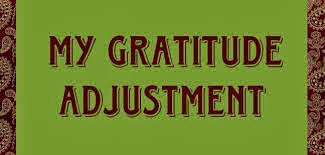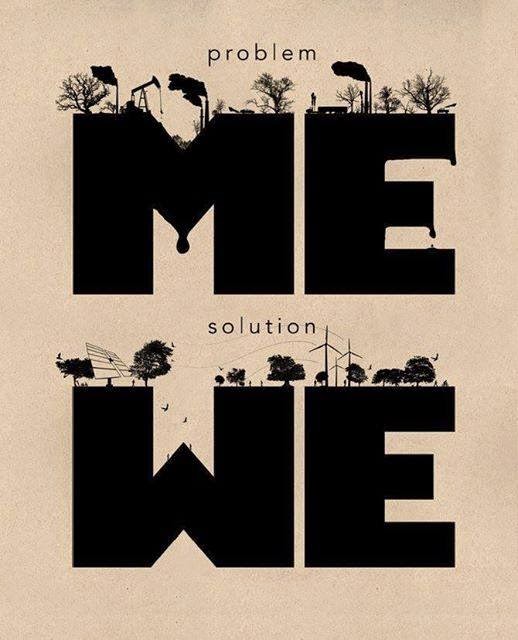 Hello friends from places near and far! We in the U.S. have a holiday called Thanksgiving - while we are aware of the irony of giving thanks for a tradition that goes back to the Native Americans whom we slaughtered and continue to harm as a country that does not mean that the root of this tradition which is thanks and gratitude is any less powerful. In fact we should be grateful to those mistreated individuals for teaching us what we refused to learn ourselves - the power of Thanksgiving and of giving Thanks. For that I am grateful. Are you? Today we look at our needs for attitude and gratitude adjustments in our life and work.
Hello friends from places near and far! We in the U.S. have a holiday called Thanksgiving - while we are aware of the irony of giving thanks for a tradition that goes back to the Native Americans whom we slaughtered and continue to harm as a country that does not mean that the root of this tradition which is thanks and gratitude is any less powerful. In fact we should be grateful to those mistreated individuals for teaching us what we refused to learn ourselves - the power of Thanksgiving and of giving Thanks. For that I am grateful. Are you? Today we look at our needs for attitude and gratitude adjustments in our life and work.  What Oprah Knows About the Power of Gratitude - Oprah's Lifeclass: Oprah Winfrey talks about gratitude and how powerful it is when you switch to a mindset of being grateful for what you do have and not what you don’t have."The single greatest thing you can do to change your life today would be to start being grateful for what you have right now," Oprah says. "And the more grateful you are, the more you get." Please watch, listen, and learn...
What Oprah Knows About the Power of Gratitude - Oprah's Lifeclass: Oprah Winfrey talks about gratitude and how powerful it is when you switch to a mindset of being grateful for what you do have and not what you don’t have."The single greatest thing you can do to change your life today would be to start being grateful for what you have right now," Oprah says. "And the more grateful you are, the more you get." Please watch, listen, and learn...
What is gratitude?
grat·i·tude
: a feeling of appreciation or thanks
Full Definition of GRATITUDE
: the state of being grateful : thankfulness
Examples of GRATITUDE
- Let me express my sincere gratitude for all your help.
- We remember with gratitude those who died defending our country.
Origin of GRATITUDE
Middle English, from Anglo-French or Medieval Latin; Anglo-French, from Medieval Latin gratitudo, from Latin gratusgrateful
First Known Use: 1523
Related to GRATITUDE
- Synonyms
- appreciation, appreciativeness, gratefulness, thanks,thankfulness
- Antonyms
- ingratitude, thanklessness, unappreciation, ungratefulness
Where does gratitude belong in our loves & what can it do for us?...
Gratitude: A Habit Worth Maintaining! Cultivating Gratitude - The Benefits of Gratitude for Stress Relief:
"gratitude means appreciating what's good in your life, and can transform your whole experience of stress."
 Have you ever noticed that some people seem to be able to maintain a relatively positive attitude regardless of what’s happening around them? Like everyone, they can appreciate the good times, but they also seem to be able to focus on the positive in the face of some pretty negative events. They see the good in difficult people, they see the opportunity in a challenging situation, and they appreciate what they have, even in the face of loss. Would you like to increase your ability to maintain a positive attitude in your life, even in the face of significant stress?
Have you ever noticed that some people seem to be able to maintain a relatively positive attitude regardless of what’s happening around them? Like everyone, they can appreciate the good times, but they also seem to be able to focus on the positive in the face of some pretty negative events. They see the good in difficult people, they see the opportunity in a challenging situation, and they appreciate what they have, even in the face of loss. Would you like to increase your ability to maintain a positive attitude in your life, even in the face of significant stress?
Fortunately, a positive attitude can be cultivated, with a little practice. Although we are born with specific temperamental tendencies, the brain is a muscle, and you can strengthen your mind’s natural tendency toward optimism if you work at it.
 While several factors go into emotional resilience and optimism, studies show that cultivating a sense of gratitude can help you maintain a more positive mood in daily life and contribute to greater emotional well-being and bring social benefits as well. Cultivating gratitude is one of the simpler routes to a greater sense of emotional well-being, higher overall life satisfaction, and a greater sense of happiness in life. People with a greater level of gratitude tend to have stronger relationships in that they appreciate their loved ones more, and their loved ones, feeling that appreciation, tend to do more to earn it. And because those who are happier, sleep better, and enjoy healthy relationships tend to be healthier, grateful people tend to be healthier people.
While several factors go into emotional resilience and optimism, studies show that cultivating a sense of gratitude can help you maintain a more positive mood in daily life and contribute to greater emotional well-being and bring social benefits as well. Cultivating gratitude is one of the simpler routes to a greater sense of emotional well-being, higher overall life satisfaction, and a greater sense of happiness in life. People with a greater level of gratitude tend to have stronger relationships in that they appreciate their loved ones more, and their loved ones, feeling that appreciation, tend to do more to earn it. And because those who are happier, sleep better, and enjoy healthy relationships tend to be healthier, grateful people tend to be healthier people.
Fortunately, gratitude can be cultivated, and this can be accomplished in several ways. For the next few weeks, try some of the following exercises, and you should notice a significant increase in your feelings of gratitude -— you will likely find yourself noticing more positive things in your life, dwelling less on negative or stressful events and feelings of ‘lack,’ and having a greater sense of appreciation for the people and things in your life.
 Make Gentle Reminders: When you notice yourself grumbling about a negative event or stressor in your life, try to think of 4 or 5 related things for which you are grateful. For example, when feeling stressed at work, try to think about several things that you like about your job. You can do the same with relationship stress, financial stress, or other daily hassles. The more you gently remind yourself of the positives, the more easily a shift toward gratitude can occur.
Make Gentle Reminders: When you notice yourself grumbling about a negative event or stressor in your life, try to think of 4 or 5 related things for which you are grateful. For example, when feeling stressed at work, try to think about several things that you like about your job. You can do the same with relationship stress, financial stress, or other daily hassles. The more you gently remind yourself of the positives, the more easily a shift toward gratitude can occur.
Be Careful With Comparisons
Many people cause themselves unnecessary stress by making comparisons. More specifically, they cause themselves stress by making the wrong comparisons. They compare themselves only to those who have more, do more, or are in some way closer to their ideals, and allow themselves to feel inferior instead of inspired. In cultivating gratitude, you have one of two options if you find yourself making such comparisons: You can either choose to compare yourself to people who have less than you (which reminds you how truly rich and lucky you are), or you can feel gratitude for having people in your life who can inspire you. Either road can lead away from stress and envy, and closer to feelings of gratitude.
Keep a Gratitude Journal
One of the best ways to cultivate gratitude is to keep a gratitude journal. Not only are you combining the benefits of journaling with the active adoption of a more positive mindset, you are left with a nice catalog of happy memories and a long list of things in your life for which you are grateful. (This can be wonderful to read during times when it’s more difficult to remember what these things are.)
Keeping a gratitude journal is simple; see this gratitude journal article for ideas on different ways to maintain one.Because habits are usually formed within two or three weeks, you will have to actively focus on maintaining gratitude less and less as you go, and the habit of a more positive (and less stress-inducing) attitude will be more automatic. And greater feelings of emotional well-being can be yours.(By Elizabeth Scott, M.S.)
To have the attitude of gratitude is to become the best we can be, to not harm others, to live joyously in the now. This is something we do together, as one, and shoulder-to-shoulder as equals. This is where we move from self-absorbed "me" to the oneness of "we".
We live in a nation where everyone is on the pursuit of happiness. Each individual has his or her own path this journey takes. For some, the search begins in books; for others it comes through service.
But perhaps the most popular form of seeking happiness is through the accumulation of “things.” Materialism, though, is bought at a cost. A society that feels entitled to what it receives does not adequately express gratitude. Seen through the lens of buying and selling, relationships as well as things are viewed as disposable, and gratitude cannot survive this materialistic onslaught. The lack of gratitude is contagious, and is passed from one generation to the next.
Conversely, the act of gratitude is also viral and has been found to greatly and positively influence not just relationships, but one’s own emotional status.
Research has proven that gratitude is essential for happiness, but modern times have regressed gratitude into a mere feeling instead of retaining its historic value, a virtue that leads to action. Just as great philosophers such as Cicero and Seneca conclude in their writings, gratitude is an action of returning a favor and is not just a sentiment. By the same token, ingratitude is the failure to both acknowledge receiving a favor and refusing to return or repay the favor. Just as gratitude is the queen of the virtues, ingratitude is the king of the vices.(day.http://greatergood.berkeley.edu/article/item/what_stops_gratitude)
Given its magnetic appeal, it is a wonder that gratitude might be rejected. Yet it is. If we fail to choose it, by default we choose ingratitude. Millions make this choice every. Are you going to be one of millions or one in a million|??
In gratitude and humility we turn to realities outside of ourselves. We become aware of our limitations and our need to rely on others. In gratitude and humility, we acknowledge the myth of self-sufficiency. We look upward and outward to the sources that sustain us. Becoming aware of realities greater than ourselves shields us from the illusion of being self-made, being here on this planet by right—expecting everything and owing nothing. The humble person says that life is a gift to be grateful for, not a right to be claimed. Humility ushers in a grateful response to life.
Reigning in entitlement and embracing gratitude and humility is spiritually and psychologically liberating. Gratitude is the recognition that life owes me nothing and all the good I have is a gift. It is not a getting of what we are entitled to. My eyes are a gift. So is my wife, my freedom, my job, and my every breath.
Recognizing that everything good in life is ultimately a gift is a fundamental truth of reality. Humility makes that recognition possible. The humble person says, “How can I not be filled with overflowing gratitude for all the good in my life that I’ve done nothing to merit?” The realization that all is a gift is freeing, and freedom is the very foundation upon which gratitude is based. True gifts are freely given, and require no response.
GRATITUDE ADJUSTMENTS WILL SET YOU FREE!!!
WHAT ARE YOU GRATEFUL FOR? WHAT AREN'T YOU GRATEFUL FOR THAT YOU SHOULD BE? TAKE SOME TIME FOR INNER REFLECTION AND THEN START ACTING ACCORDINGLY. YOUR FUTURE SELF WILL GRATEFUL! AND SO WILL THE WORLD!
MUCH PEACE MY FRIENDS. HAVE A HAPPY AND HEALTHY DAY AND Y'ALL COME BACK NOW YOU HERE? ; )
- Audrey Elizabeth Korte









No comments:
Post a Comment